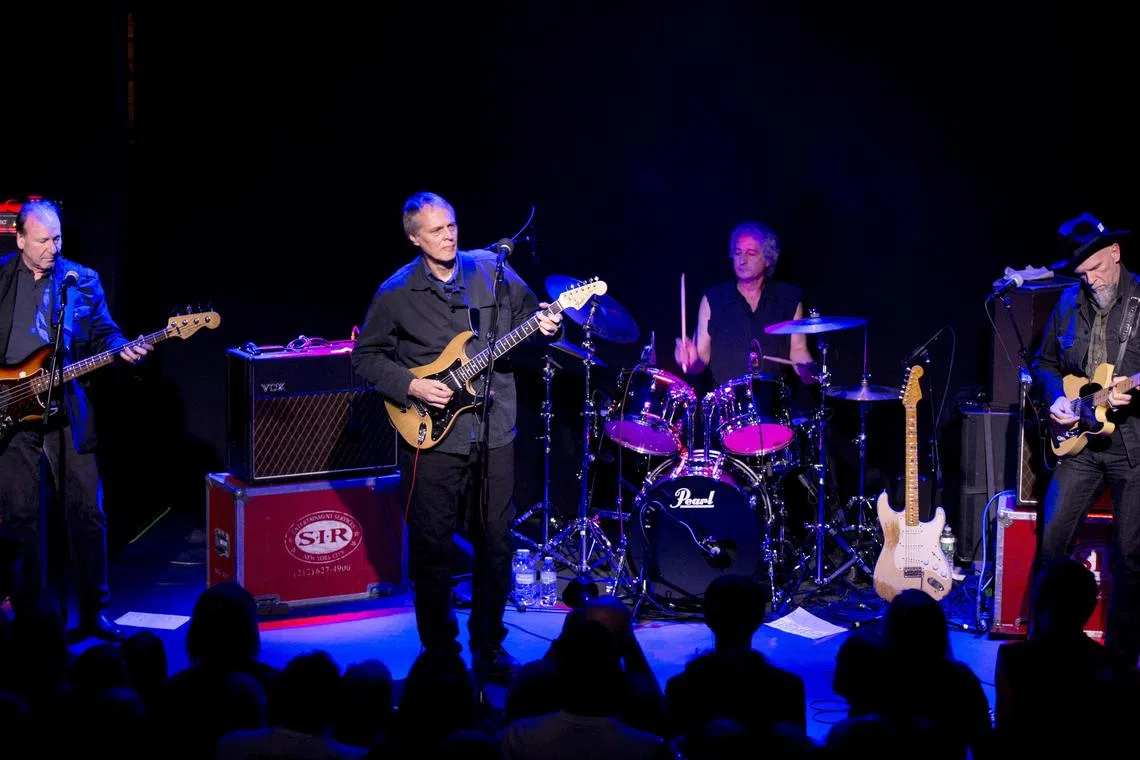Tom Verlaine, guitarist and frontman of punk band Television, dies at 73
Sign up now: Get ST's newsletters delivered to your inbox

Tom Verlaine died in Manhattan on Jan 28. He was 73.
PHOTO: NYTIMES
Follow topic:
NEW YORK - Tom Verlaine, whose band Television was one of the most influential to emerge from the New York punk rock scene centred on the nightclub CBGB – but whose exploratory guitar improvisations and poetic songwriting were never easily categorisable as punk or, for that matter, as any other genre – died on Saturday in Manhattan. He was 73.
His death was announced by Ms Jesse Paris Smith, the daughter of Verlaine’s former love interest (and occasional musical collaborator) Patti Smith, who said that he died “after a brief illness”.
Although Television achieved only minor commercial success and broke up after recording two albums, Verlaine had an enduring influence, especially on his fellow guitarists. He was also Television’s singer, primary songwriter and co-producer.
“Verlaine persisted in playing the guitar while those around him were brandishing it as a weapon,” American music journalist Kristine McKenna wrote in Rolling Stone magazine in 1981.
Lenny Kaye, guitarist for the Patti Smith Group, said in an interview that “Tom was capable of anything”, adding: “He could move from chaotic soundscapes of free jazz to delicate filigree. It wasn’t covered up with distortion. He had a real sense of the instrument and its expressive powers.”
Reviewing Television for the magazine Rock Scene in 1974, Patti Smith wrote that Verlaine “plays guitar with angular inverted passion like a thousand bluebirds screaming”. She also declared that he had “the most beautiful neck in rock & roll.”
Tom Verlaine was born Thomas Joseph Miller on Dec 13, 1949, in Denville, New Jersey, the son of Victor and Lillian Miller. The family relocated to Wilmington, Delaware, when Tom was a child.
He attended a boarding school in Delaware, where he studied classical music and played saxophone. He was equally influenced by rock bands like the Yardbirds and the Rolling Stones and free-jazz musicians like Albert Ayler and John Coltrane.
He ran away from school with a classmate, Richard Meyers, later known as singer Richard Hell.
“Our plan was to become poets in Florida where the living was easy,” Hell said in an email. Camping in Alabama, they set a field on fire and were arrested and sent back home.
Hell soon went to New York, and after graduating from high school, Verlaine joined him. They wrote and published poetry together; Miller renamed himself Tom Verlaine, in tribute to 19th-century French poet Paul Verlaine.
Hell, 73, recalled the two friends being exuberant teenagers on Second Avenue near St Mark’s Church in the early days of spring: “As we walked down the street, we’d start rapidly weaving between the parking meters making buzzing sounds with our mouths and flapping our bent arms, fertilising the parking meters. Tom was often lightheaded and whimsical back then.”
In 1972, inspired by the New York Dolls, they started a band called the Neon Boys. Verlaine bought an electric Fender Jazzmaster guitar for himself and picked out a US$50 bass for Hell; their friend Billy Ficca joined them on drums.
In 1973, they added Richard Lloyd, a guitarist, and renamed themselves Television. They chose the name because they had a distaste for the medium and hoped to provide an alternative. Verlaine also enjoyed the resonance with his initials, T.V.
After seeing a performance by Television in 1974, late singer David Bowie called the group “the most original band I’ve seen in New York”.

Tom Verlaine (second from left) and Television performing at Rough Trade NYC, in New York, on Nov 29, 2013.
PHOTO: NYTIMES
However, Hell’s emotive, chaotic outlook on music clashed with Verlaine’s more controlled approach. Hell was replaced by Fred Smith in 1975 and later went on to form the punk band Richard Hell and the Voidoids.
Television signed with Elektra Records and in 1977 released its first album, Marquee Moon, which featured hypnotic guitar work that ranged from mournful to ecstatic.
The album contained eight songs, mostly written by Verlaine, and showcased two lead guitarists who did not just trade solos but also built sonic cathedrals out of countermelodies and interlocking parts.
Although Verlaine was renowned as a lead guitarist, Lloyd said that his work as rhythm guitarist was underrated.
“He used to drag me kicking and screaming through five minutes of solos,” he said in an interview.
Verlaine’s lyrics (which he sang in a pinched but expressive tenor) were sometimes poetically abstract, sometimes slyly funny. The song Venus featured the line “I fell right into the arms of Venus de Milo”.
In 1991, Verlaine told Details magazine: “As peculiar as it sounds, I’ve always thought that we were a pop band. You know, I always thought Marquee Moon was a bunch of cool singles. And then I’d realise, Christ, this song is 10 minutes long, with two guitar solos.”
While Marquee Moon received rapturous reviews and now regularly appears on lists of the greatest rock albums ever made, that did not translate into significant sales or airplay.
“Shooting himself in the foot was a particular talent of his,” Lloyd said of Verlaine. “He had a will of iron, and he would say no to big tours and big shows.”
Asked by The New York Times in 2006 to summarise his life, Verlaine replied, “Struggling not to have a professional career.”
Television released a second album, Adventure, in 1978 and then broke up. The band reunited in 1992 for an album simply called Television, followed by periodic tours.
The group’s members continued to employ “an experimental approach”, Verlaine told Details. “It’s like when we started, all falling together from different angles.”
Verlaine released nine albums under his own name over the decades, some emphasising songs and others emphasising guitar heroics.
Reviewing a performance by his band at the Bowery Ballroom in 2006, Times critic Jon Pareles wrote: “Mr Verlaine’s guitar leads didn’t flaunt virtuosity by streaking above the beat. They tugged against it instead: lagging deliberately behind, clawing chords on offbeats, trickling around it or rising in craggy, determined lines.”
Verlaine leaves no immediate survivors. However, he does leave an outsize influence on other musicians. The 2022 album Blue Rev by the Canadian group Alvvays, for example, includes a song titled Tom Verlaine. NYTIMES

